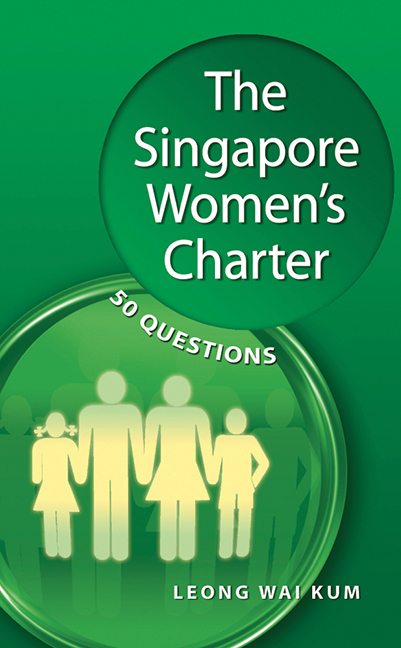Book contents
- Frontmatter
- Contents
- List of Questions
- Foreword
- Preface
- Part I What is the Women's Charter?
- Part II Marriage
- Part III Regulation of Husband-Wife Relationship
- Part IV Regulation of Parent-Child Relationship
- Part V Violence in the Family
- Part VI Divorce and the Process
- Part VII Maintenance
- Part VIII Division of Matrimonial Assets
- Part IX Muslims
- Epilogue
- References
- Index
- About the Author
Part IV - Regulation of Parent-Child Relationship
Published online by Cambridge University Press: 21 October 2015
- Frontmatter
- Contents
- List of Questions
- Foreword
- Preface
- Part I What is the Women's Charter?
- Part II Marriage
- Part III Regulation of Husband-Wife Relationship
- Part IV Regulation of Parent-Child Relationship
- Part V Violence in the Family
- Part VI Divorce and the Process
- Part VII Maintenance
- Part VIII Division of Matrimonial Assets
- Part IX Muslims
- Epilogue
- References
- Index
- About the Author
Summary
How does the Women's Charter regulate the relationship between parents and their child?
Section 46(1)
The Women's Charter in section 46(1) directs the husband and wife that they are mutually bound to cooperate with each other in caring and providing for their children.
Parental responsibility
The Women's Charter tells all parents that they owe parental responsibility towards their child or children. Parental responsibility has become a commonly used concept since the United Nations-sponsored Convention on the Rights of the Child adopted it, but this international document did not exist until 1989. Singapore enacted section 46(1) in 1961. The concept has been a part of the law of Singapore for a good twenty-eight years before it became accepted by the international community as the moral way to convey the relationship between parents and their child! This is not to say that the United Nations copied the concept from Singapore but it affirms the moral quality of the family law in Singapore that some of the ideas within the Women's Charter predated their gaining international acceptance.
Assume responsibility
By becoming a parent a person assumes responsibility towards the child. An adult becomes a parent of a child either naturally through the biological process of conception (whether or not there was any medical assistance in the conception or gestation of the child) or through the judicial process of adoption. The details of the effect of assisted conception on parenthood are beyond the scope of this book. The point is that a parent assumes the role voluntarily. It is by no means forced on him or her. Particularly while a child remains young and dependent on the parent it is right of the law to view the parent as owing responsibility towards the child.
Cooperative
Parental responsibility is to be discharged cooperatively. The father and mother of a child are expected by law to cooperate with each other in caring and providing for him or her. Indeed, parenting may be said to require the highest cooperation by the parents as only then can the well-being of the child be assured. The law in Singapore demands no less of all adults who choose to become parents.
Moral perspective
The concept of parental responsibility conveys the parent-child relationship in a moral tone.
- Type
- Chapter
- Information
- The Singapore Women's Charter50 Questions, pp. 39 - 52Publisher: ISEAS–Yusof Ishak InstitutePrint publication year: 2011



